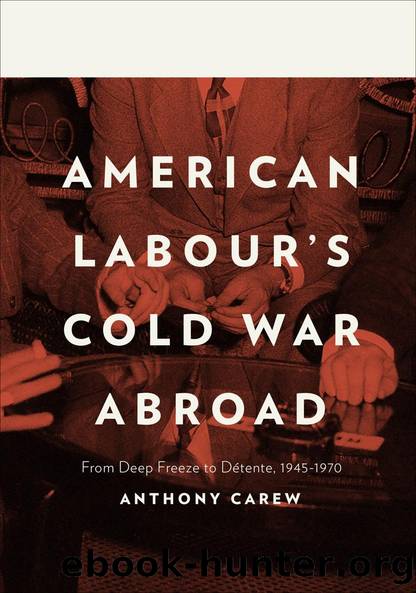American Labour's Cold War Abroad by Anthony Carew

Author:Anthony Carew [Carew, Anthony]
Language: eng
Format: epub
Tags: History, Modern, 20th Century, Social History
ISBN: 9781771992114
Google: gD9vDwAAQBAJ
Publisher: Athabasca University Press
Published: 2018-09-21T22:28:34+00:00
Bringing Foreign Policy Differences to a Head
At the special executive council on 16 June 1966, Walter Reuther was very much on the defensive for having placed his criticisms of the AFL-CIO in the public arena. Meany gave him a dressing down and the UAW leader was forced to reassure the meeting that his observations on the walkout were meant to censure neither Meany nor Faupl. But on his wider criticism of AFL-CIO international policy generally he held firm; he expressed âdeep concernâ at the drift in international affairs and the fact that federation policy was neither positive nor constructive. The meeting voted by three to one to endorse the action taken by Faupl and Meany, but Reuther secured agreement to hold a further special meeting in November to review the whole range of AFL-CIO foreign policy, which he described as ârigidâ and âfrozenâ and contrary to President Johnsonâs âbridge-buildingâ approach to the Soviet Union.109 In the meantime, Victor Reutherâs specific allegations about AIFLD and the CIA were slated for separate discussion at the regularly scheduled executive council meeting in August.
Privately, Victor Reuther claimed not to be worried by Meanyâs âstatistical majorityâ in the executive council, comforted in the belief that those supporting his brother represented a larger share of total AFL-CIO membership. More importantly, he told the British labour counsellor: âWhile George may have the votes in the EC, he sure as hell wonât get any votes in Europe.â Victor saw this as the start of a major battle over foreign policy and wrote bullishly to Dan Benedict: âthis is but the opening shot in what I am sure will eventually involve a broadside against many aspects of AFL-CIO policies in the international field.â110
Within the AFL-CIO international affairs department there was equally a sense that a decisive confrontation was now in the offing, combined with an air of confidence over the eventual outcome. The AFL-CIO executive council had chosen to make no public statement over these internal differences that would dominate discussion in the coming months. Indeed, Walter Reuther was subsequently condemned for continuing to talk to the press about the issues involved. However, Jay Lovestoneâs views found their way into print via the syndicated column of labour correspondent Victor Riesel. Describing the UAW offensive as âopen warfare,â he predicted âa long hot summer.â Echoing Lovestoneâs thinking, Riesel offered a scenario in which the outcome would be determined by whichever side had the best links to President Johnson: âMeany and the overwhelming bloc of U.S. labour chieftains will not retreat. . . . The Reuthers will then tell the Meany majority to jump in the Potomac . . . and then proceed on their own with the bridge-building. The big question is, however, âWho will control the pontoon to the White House?ââ111
Victor Reuther was preparing in depth for the executive council meeting in August. Throughout the summer he assigned his international affairs department staff to sleuthing workâwhat he dubbed âOperation Augustââtracking down AIFLD representatives and taking statements from them.112 In
Download
This site does not store any files on its server. We only index and link to content provided by other sites. Please contact the content providers to delete copyright contents if any and email us, we'll remove relevant links or contents immediately.
Women and Jewish Marriage Negotiations in Early Modern Italy by Howard Tzvi Adelman(460)
Warrior King by Wilbur Smith(425)
The Battle of Austerlitz by 50minutes(316)
18 real-life stories of serial killers and murderers with solved and unsolved killings from the USA, UK, Europe, and beyond. by Ben Oakley(313)
Youth, Heroism and War Propaganda: Britain and the Young Maritime Hero, 1745â1820 by D. A. B. Ronald(306)
Violence and Emotions in Early Modern Europe by Susan Broomhall;Sarah Finn;(305)
Who's Who in the Zulu War, 1879: The British by Adrian Greaves Ian Knight(303)
The American Crisis by Unknown(296)
The Seeker by S. G. MacLean(250)
The Origins of French Absolutism, 1598-1661 by Alan James(247)
The Dutch East India Company and British East India Company: The History and Legacy of the Worldâs Most Famous Colonial Trade Companies by Charles River Editors(238)
The Traitor of Colditz by Robert Verkaik(234)
The Thirty Years War â Complete by Friedrich Schiller(227)
Fires of Faith by Catholic England under Mary Tudor(223)
A Genius for Confusion by Richard M. Fried(222)
Interest and Connection in the Eighteenth Century by Jacob Sider Jost(221)
The Slave Trade in Africa by Simon Webb;(220)
Invisible Worlds by Peter Marshall(219)
The Opium Wars: Exploring the Addiction of Empires from Beginning to End by Ramos Adrian & Compacted History(216)
